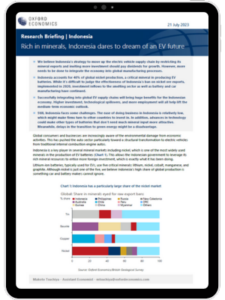Rich in minerals, Indonesia dares to dream of an EV future

We believe Indonesia’s strategy to move up the electric vehicle supply chain by restricting its mineral exports and inviting more investment should pay dividends for growth. However, more needs to be done to integrate the economy into global manufacturing processes.
What you will learn:
- Indonesia accounts for 40% of global nickel production, a critical mineral in producing EV batteries. While it’s difficult to judge the effectiveness of Indonesia’s ban on nickel ore exports, implemented in 2020, investment inflows to the smelting sector as well as battery and car manufacturing have continued.
- Successfully integrating into global EV supply chains will bring huge benefits for the Indonesian economy. Higher investment, technological spillovers, and more employment will all help lift the medium-term economic outlook.
- Still, Indonesia faces some challenges. The ease of doing business in Indonesia is relatively low, which might make firms turn to other countries to invest in. In addition, advances in technology could make other types of batteries that don’t need much mineral input more attractive. Meanwhile, delays in the transition to green energy might be a disadvantage.
Tags:
Related posts

Post
How Canada’s wildfires could affect American house prices
The Northern Hemisphere is now heading into the 2024 fire season, having just had its hottest winter on record. If it is anything like last year, we can expect to see further impacts on people, nature, and global markets.
Find Out More
Post
Promising trends signal optimism for the hotel sector
The global travel recovery took great strides in 2023, with some destinations already reporting a full recovery back to pre-pandemic levels. Trends continue to suggest further growth in tourism activity going into this year, signalling optimism for the hospitality sector going forward. But risks stemming from inflation, geopolitical tensions and climate change will persist.
Find Out More
Post
Beyond assumptions – the dynamics of climate migration
Millions of people have already been displaced because of environmental shocks, but many aspects of climate migration remain poorly understood. This confusion has led to oversimplified assumptions about its causes and effects – in reality, it’s more complicated and has many nuances.
Find Out More